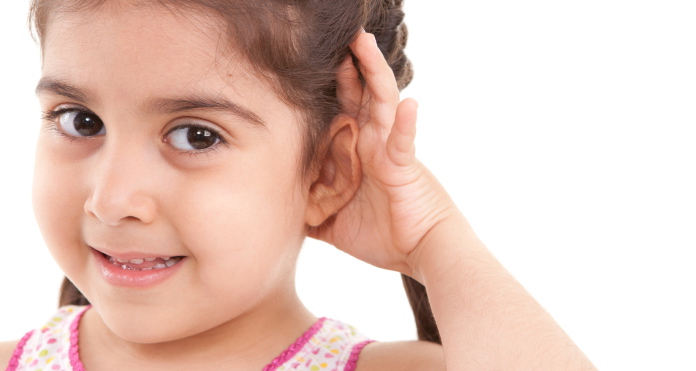Listen up!
Did you know that in Australia between nine and 12 children per 10,000 live births are born with a moderate or greater hearing loss in both ears? Did you know that around another 12 children per 10,000 acquire a hearing impairment that requires hearing aids by the age of 17?
You now know that hearing loss can be present at birth or acquired later on in life. Hearing loss can be classified as conductive, sensorineural or mixed and described as mild, moderate, severe or profound depending on which part of the auditory system is affected and the level of impact on a person’s everyday life. Good news! You won’t be tested on this later. I will, however, ask you to consider these two questions. What type of hearing loss impacts a child’s speech development? How severe does a hearing loss need to be to impact a child’s speech development? The short answer is that all types of hearing loss and levels of severity have the potential to impact a child’s speech development. Yes, even a mild hearing loss! How, do you say?
Children learn to speak by listening to others. In order for a child to start talking and articulate themselves clearly, they need to hear sounds correctly. It therefore comes as no surprise that hearing is critical to a child’s speech development. Have you ever heard a young child say ‘bish’ for ‘fish’ or ‘moke’ for ‘smoke’? Well, if a child cannot hear particular sounds, such as ‘f’ or ‘s’, they are not going to include them in their own speech and this is likely to make them difficult to understand, particularly to unfamiliar communication partners. Common sense, right? Now comes the tricky part. How do you know if a child is actually hearing sounds correctly? Hearing loss often goes unnoticed in the first few years of life as children learn to communicate. To detect hearing loss as soon as possible, keep an eye on the following behaviors:
Early Signs of Hearing Loss (Infants)
-
- Not moving the eyes or head towards a sound
- Not reacting to loud noises
- Not responding to a parent’s voice
- Not imitating sounds
Later Signs of Hearing Loss (Toddlers)
-
- Not responding to own name
- Inconsistently responding to sounds
- Not following instructions correctly
- Frequently requesting repetition
- Turning up the volume on electronic devices e.g. iPad
- Limited, poor or no speech
- Difficulty learning
Middle-ear infections (otitis media) are also important to keep in mind as they are common among young children, particularly between pre-school and primary school. An inflammation of the middle ear is often accompanied by fluid in the middle ear space. This makes it difficult for sound waves to reach the inner ear (cochlea) and speech can be muffled, distorted and/or difficult to hear. Recurrent middle-ear infections can therefore result in temporary or permanent hearing loss.
Typically, the earlier hearing loss occurs in a child’s life, the more damaging the effects on their speech development. That’s why early detection is vital! So, if you are observing some of the above behaviours or a child you know suffers from recurrent middle-ear infections, what should you do? Where should you go? Who should you see? Firstly, don’t panic! You can schedule an appointment with a GP to discuss your concerns or organise a hearing assessment with an Audiologist. The Audiologist will use the results to determine the presence of a hearing loss and recommend an appropriate treatment plan, if necessary. If a child does present with hearing loss that has impacted speech development, the Audiologist might recommend articulation therapy with a Speech Pathologist. The Speech Pathologist will formally assess the child’s articulation and assist them in correcting their errors and acquiring new sounds to enable effective communication with others.
If you’re a parent, teacher or fellow Speech Pathologist, and you detect signs of hearing loss in a young child, don’t be afraid to act! After all, life is worth listening to.

